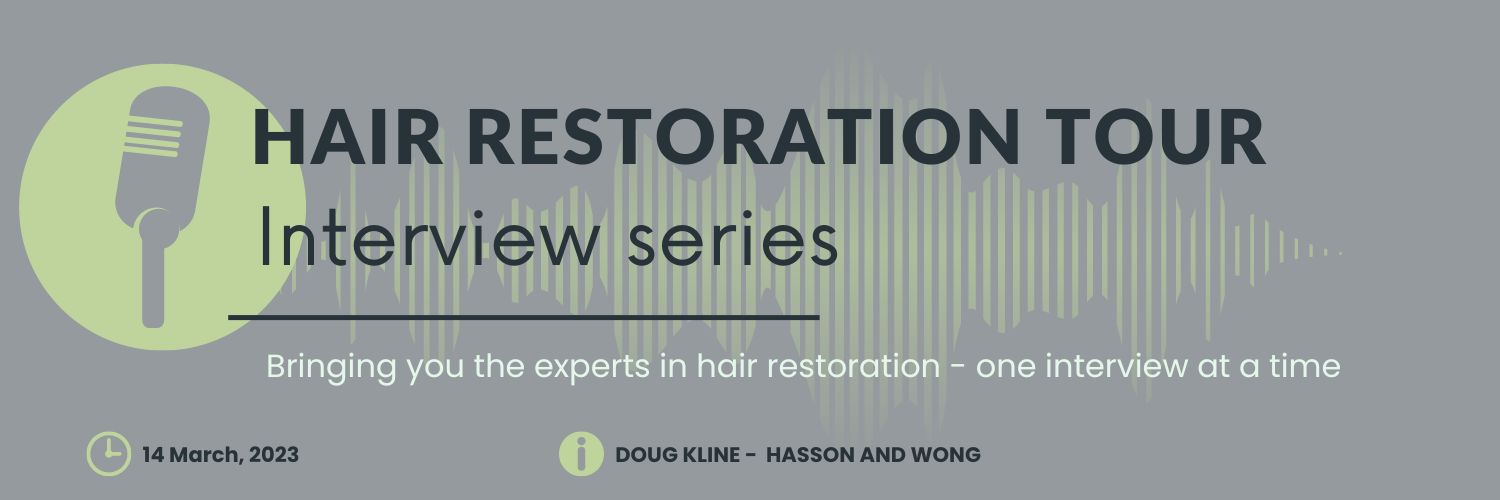

HRT: Can you tell us about your background and how you became a hair transplant consultant and how long you have been doing this for?
Doug: My background was in retail with a company emphasis on excellent customer service. A friend of mine was working for Hasson and Wong and I became interested in a career there. It was about the same time my own hair loss was starting to bother me and affect my confidence. I expressed interest in a role at Hasson and Wong and was given the opportunity to pursue a position there. It was also about the same time Hasson and Wong was coming into prominence as the leaders in hair restoration. I’m presently in my 22nd year at Hasson and Wong.
Perhaps the most important aspect in determining whether a person is a good candidate is quality and quantity of their donor hair.
HRT: What are the most common reasons people seek out hair transplant procedures?
Doug: Hair loss can affect different people in diffident ways. For some it has little if any negative impact on their daily lives and how they feel about themselves. For others it can adversely affect many aspects of their lives and erode their confidence. When hair loss limits a person’s ability to feel comfortable in social situations and interferes with their desire to participate in certain activities, they start to think that maybe if they had their hair back, they could have a better quality of life and once again like what they see in the mirror.
HRT: How do you evaluate whether someone is a good candidate for a hair transplant?
Doug: Perhaps the most important aspect in determining whether a person is a good candidate is quality and quantity of their donor hair. This is one of the first places we will start. The other important factor is how much loss are we are presented with and how large the area is we’d like to restore. We will also take into consideration final hair loss pattern and what are the patients’ expectations. The better the donor supply in relation to the loss, the better the candidate. Conversely, limited donor reserves with extensive present or future potential loss, will make a patient a less than ideal candidate for a hair restoration procedure. In the end, a patient would be deemed a good candidate if we can provide enough of a cosmetic benefit to enhance the appearance and achieve a natural looking result that will make both the doctor and more importantly the patient happy.
All consultants are not created equal but they should have a good degree of knowledge and confidence when discussing all relevant and important topics.
HRT: What are some of the most common concerns or questions that patients have about hair transplant procedures, and how do you address them?
Doug: Questions can be how natural will it look? What will the density be like? How much donor hair will I have left for future considerations if necessary? Will I have a scar? How will I look right after the procedure and how will I look in one month? Will anyone notice I’ve had something done in the first few months? Giving the patient as much honest information will help them prepare for their post-op experience. I will often refer them to our hair transplant timeline section of the website to review other patients experiences from the day after the procedure up to several months post-op. This can give them a good idea of what to expect.
HRT: What some of the most important questions prospective hair transplant patients should be asking consultants?
Doug: Am I a good candidate? How will it look? Will it look natural? Is what I want realistic? Are you able to achieve my hair restoration goals? Can you achieve the desired density in one procedure? How important is medication in my case? What is my final hair loss pattern? It is important for a clinic to create a plan not only for today but that takes into account potential future loss. Is the clinic putting in place a plan that considers my potential future hair loss and what position that plan will place me later in life? Have they discussed how important medication may or may not be in my case?

HRT: Are consultants as qualified to answer questions as a surgeon would be?
Doug: As a general rule no. Depending on the consultant’s experience and time spent learning from the doctor, some can be qualified to answer most questions. In my case, I’ve been with Hasson and Wong for 22 years and spent the better part of 15 years working alongside the doctors listening and learning everything the doctors may discuss in a consultation. Also observing procedures and discussing all aspects of the process with team members as well. This has given me a unique advantage over a consultant with less experience and there are very few topics I don’t feel confident discussing. A well-informed consultant should be able to address most, if not all the questions mentioned earlier. As would be the case with hair transplant surgeons, all consultants are not created equal but they should have a good degree of knowledge and confidence when discussing all relevant and important topics.
HRT: Are virtual consultations as accurate as in-person consultations?
Doug: An in-person consultation is always the most accurate but photos and video can also provide the necessary information to correctly assess a patient in most all cases. Only in unusual cases is it too difficult to accurately determine a patient’s candidacy without an in-person evaluation. These patients who may be more difficult to assess online are usually confined to difficult repair cases or where donor reserves and limited. A prospective patient’s difficulty in providing the proper requested information can also facilitate the need or desire for an in-person evaluation.
HRT: When submitting photos for a virtual consultation, is there a right way to do it?
Doug: Yes. Our online consultation form has instructions on how to present proper photos or video for our review. The right way includes the correct framing of the head in the photo. Photos taken too far away may lack the necessary detail. Good lighting and clarity. Lighting should come from behind the camera, photos taken into direct light may not be sufficient. If the areas of loss are not correctly presented, it is difficult to determine how many grafts may be required. Hair should also not cover area of weakness and should be combed away to reveal the extent of the loss. Before photos in the Hasson and Wong patient gallery can be a good indication of what would likely be desired.
We want to thank Doug Kline of Hasson and Wong for his time and his great insight as to what to expect and what to ask during a hair transplant consultation!


